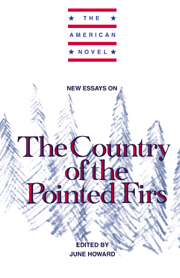Book contents
- Frontmatter
- Contents
- Series Editor's Preface
- 1 Introduction: Sarah Orne Jewett and the Traffic in Words
- 2 Country's Portrayal of Community and the Exclusion of Difference
- 3 Gender and American Realism in The Country of the Pointed Firs
- 4 Material Culture, Empire, and Jewett's Country of the Pointed Firs
- 5 Regionalism and Nationalism in Jewett's Country of the Pointed Firs
- Notes on Contributors
- Selected Bibliography
2 - Country's Portrayal of Community and the Exclusion of Difference
Published online by Cambridge University Press: 08 January 2010
- Frontmatter
- Contents
- Series Editor's Preface
- 1 Introduction: Sarah Orne Jewett and the Traffic in Words
- 2 Country's Portrayal of Community and the Exclusion of Difference
- 3 Gender and American Realism in The Country of the Pointed Firs
- 4 Material Culture, Empire, and Jewett's Country of the Pointed Firs
- 5 Regionalism and Nationalism in Jewett's Country of the Pointed Firs
- Notes on Contributors
- Selected Bibliography
Summary
ALOOK of delight came into the faces of those who recognized the plain, dear old figure [of Mrs. Blacket] beside me; one revelation after another was made of the constant interest and intercourse that had linked [Green Island] and [the] scattered farms into a golden chain of love and dependence,” Jewett's narrator remarks early in the Bowden reunion section of The Country of the Pointed Firs. In a very different vein, another guest comments later, “Somebody observed once that you could pick out the likeness of most every sort of a foreigner when you looked about you in our parish … I always did think Mari' Harris resembled a Chinee” (p. 101).
Reading the first passage, one may savor the empathic understanding of community that has made Jewett's Country so moving for many readers, myself included. Reading the second, with its use of the racist slur “Chinee” to dismiss a woman unpopular among Dunnet Landing folk and excluded from the community celebrated in Jewett's famous narrative, probably makes other readers as uncomfortable as it makes me. Most commentators seem to have responded simply by ignoring it. Except for a single essay written in 1957, Ferman Bishop's “Sarah Orne Jewett's Ideas of Race,” there is virtually no critical discussion of Jewett's views on race and little serious consideration of the genteel elitism evident in much of her writing. What little acknowledgment there is takes the form of an aside.
- Type
- Chapter
- Information
- New Essays on The Country of the Pointed Firs , pp. 39 - 60Publisher: Cambridge University PressPrint publication year: 1994
- 5
- Cited by

